Welcome to A Wild Green Heart. How's your heart this week? Mine is bruised and tender, but also overflowing with gratitude, blessings, and a fierce sense of my own power. We are always so many things at once. It's a lot sometimes, isn't it?
This has been a stormy, challenging week. A past event I thought was done and dusted reared its head and roared at me after three years of silence. My nervous system has been on high alert some days, and my attention has necessarily been focused on the matter in hand, and on finding ways to ground myself firmly back into my own body. There's been little time or space for the kind of reflective thought that writing Substack posts requires. So this is all fairly off the cuff and last minute I'm afraid.
Art by Yerp
At one point this week I joined a lovely online space, created by one of the participants simply to make some well-contained breathing space in the week. There were three other people present, and one of them had come with this question:
What do you do to ground yourself?
I found myself able to respond to this from direct, recent personal experience, so I responded:
“Place. Friends. Story.”
I said a little about each in the context of the week I was having, and I'm going to do the same here.
Place
The event in question unfolded on Sunday. It involved a lengthy exchange of messages, and I took myself to Pomona for that whole time. This was wise, because my anxiety spiked time and again up into my chest, with my heart rate racing. Time and again I asked the land, the water, the plants and the creatures to help ground me. Time and again, they did this. It's amazing what you can get from simply asking in the right places, and I'm sure most readers are aware of how passionately I feel about Pomona, and the amount of time I've spent creating a relationship there.
I have a particularly clear memory from last Sunday of sitting at the edge of Magic Pool, wracked with anxiety, and looking down at the goose on her nest. I asked her for some of the groundedness I saw in her, sitting there so peacefully in the shade at the edge of the water, guarding her eggs. And she shared it, freely. I felt it in my body. Beloved places are strong anchors for the troubled soul.
I returned to Pomona a couple of days later to tell her of my gratitude for holding me so well throughout that desperately difficult encounter. As I sat in my ritual space, I could hear a joyous melody of birdsong, and once again used the Merlin app to identify what I was hearing. As I mentioned last week, I’ve been hearing willow warblers at Pomona lately, but I’m not yet familiarised with their song. So I was surprised to discover another new voice in the mix - this one a bird I had never even heard of before, the Greater Whitethroat! Apparently this is another member of the warbler family. It seems the dense coverage of willow saplings is a beloved habitat for these beautiful singers.
As part of my thanksgiving, I told the story Pomona has shared with me back to her once more, and was rewarded with a visit from a huge, majestic heron. As I sat by the water, watching him as he watched everything else, I found myself turning my observations into a poem:
Heron Wisdom
The lithe forms of the fry, dark
against the silt, become blinking
silver lights as bodies twist and flick
against the direction of the shoal.
A pair of geese cruise into view
over the willows, honking madly
as they descend, skimming skilfully
into the waters of Magic Pool.
Sand martins fly past, circling,
diving, turning, veering; then
ascending once again, all with
effortless ease, joyful abandon.
A pair of goldfinches sing tunefully
within the cover of the trees,
then burst gleefully out into the air
above the water, flying away together.
And all the while, heron watches,
silent; motionless except his great
spear-beaked head, which he slowly
tilts and turns, taking in Everything.
Here is wisdom. To be present and still.
To observe, attentively. To listen deeply.
To not be moved - except inwardly -
by the constant activity of other beings.Story
Not long after returning home - utterly spent - from my difficult Sunday interaction at Pomona, I was scheduled to join an online storytelling session. Part of me considered not attending; but something I've learned again and again over the last five years is that myths and stories are powerful medicine for troubling times. Finding yourself somewhere in a particular story can be an instructive, supportive practice.
The story told was one I'm familiar with, though this particular version differed in some of the details from what I'd heard before. It is commonly known as John of Swaffham, or John of the Dream. In this version, there's a farmer in the north of England. He's very content with his work and his life, and he particularly loves the old oak tree he rests against at the end of each day. There's no outside threat to this contentment, no rupture. But one night he has a clear and vividly remembered dream, in which he goes to London Bridge, digs beneath it, and finds treasure.
So, feeling compelled, off he goes on the long journey on foot, all the way to London, through countless villages and towns, meeting folk with increasingly unfamiliar ways and accents. Our farmer remains curious and friendly, finds places to stay, and learns as he travels. Finally, arriving at London Bridge, he's overcome with a feeling of self-consciousness and foolishness. He can't just dig there; what will people think? So he sits down near the bridge, he waits and he watches.
On the third day of sitting, a shopkeeper approaches him. “You're a stranger round here, aren't you? I've been watching you just sitting here for the last three days - what are you doing?” The farmer responds by somewhat sheepishly relating his dream to the other man, who responds by saying, “That's strange! I had a dream last night of a man from the north of England - a farmer - and in his garden was a big old oak tree, and he dug beneath it and discovered treasure!”
Upon hearing his own dream mirrored in such a fashion, the farmer thanks the shopkeeper, gets up and makes the long walk home. In this version of the story, we don't know if he dug in the earth or found treasure there; only that he remained content with his lot for the rest of his days.
Hearing the story felt like being held by a larger, stronger being. It was a very gentle, comforting, deep-rooted experience. Hearing it brought the word “home” strongly into my awareness, and it reminded me of these words from Herman Hesse’s wonderful little book, Wandering, from the chapter appropriately called Trees:
You are anxious because your path leads away from mother and home. But every step and every day lead you back again to the mother. Home is neither here nor there. Home is within you, or home is nowhere at all.
I was very encouraged to find an oak at the heart of this tale, knowing that Beltane was approaching, and along with it the month of May, associated by the Celtic people with the oak tree. More on all that shortly.
But the place I found myself most vividly in the story was in the moment when the shopkeeper shares his mirror image dream with the farmer, which is the moment that sends him back Home. Because one of the things I noticed at Pomona as my anxiety spiked viciously in my chest, was a conversation with a good friend the previous week, who had talked to me about their anxiety, present due to a perceived threat, and described in a very similar way.
We’d had a really generative conversation, and I was delighted that by the end of it she had found a way to navigate the issue and to feel grounded again. Not only that, but I received a message from her later to say that the person who was the source of the anxiety had, out of the blue, made a communication that clarified something and alleviated any possible accusation or threat. Now here I was, experiencing something very similar and reaching out to her for support. It's impossible to talk about finding your anchors in life without talking about friends.
Friends
Between hearing the story and the arrival of Beltane were three days, which veered between extremely fraught and deeply easeful. During that time I had long, supportive conversations with three separate friends, each reflecting back different things to me, each of them valuable and affirming in their own way. I felt full of gratitude for the friendships I have held dear and cultivated over the years. I was also soothed into a state of grounded calm. As I’m writing this, and thinking of the different ways I have felt held by close friends this week, I am mindful of a short poem from my recent collection, The Relational Body, on the subject of friendship. In this moment, I cannot think of better ways to express just how important my friends are (we’d be here all year) and have been this week, so the poem will have to do:
Held
Tonight I'm surrounded:
a circle of companions, a halo of ash,
a musical invocation of bats;
the shouts of children down by the lake,
the intangible bonds of friendship we make.
Tonight I am Held.Beltane
Beltane is the Celtic festival celebrated on 1st May each year, just as spring is reaching its most fulsome greening and flourishing. As Ian Siddons Heginworth writes in the book I am frequently quoting here, Environmental Arts Therapy and the Tree of Life:
The whole world feels new and freshly painted. It is as if we have stepped through the doorway and found our home renewed.
This doorway leads us into the light half of the Celtic year, so we bring with us much that was unconscious and in the dark into consciousness and into the light.
To the Celts, this doorway was the oak tree. Its Celtic name, Duir, is the root of our word for door and means solidity and protection. Castle doors were made of oak. They kept the enemy out and welcomed the beloved home. As we step through this door, there are lessons to be learnt about home, its boundaries and its openings, as well as the skeletons we keep in its dark and secret cupboards.
There is much in this May chapter of the Environmental Arts Therapy book that speaks of boundaries, castles, and also of our inner child. I knew I needed to seek out a familiar oak tree to celebrate Beltane with. The one that I sensed was calling me was the oak I know as my Young Dragon Tree, largely because of the shape of this broken branch.
To be fair, it used to look even more dragon-like, but it has clearly been stood on repeatedly over the years. The shape has been caused by a grievous wound to the tree where a branch has been broken off. So it is with our own inner fire-breathing parts - a defensive response to the wounds that life has dealt us, often in childhood. I wanted to visit this tree and to visit my inner child while I did so. I had a notion of wanting to create a fort or castle in which to enact a reinforcing of my own boundaries and power. As I walked up the slope towards my tree, I saw that someone had well and truly prepared the way!
As you can see from the photo, someone had created a marvellous drawbridge from branches and hay bales, right into the heart of the oak. Here I stood and used my body to form defensive stances, drawing on my inner strength to repel unwanted invasions into my life, and to make declarations such as “No further!” and that classic Gandalf line, “You shall not pass!” It was both good fun and an effective way of reconnecting myself to my source of inner power. My inner child seemed very pleased with the whole experience.
Young me is at the left of the picture
While in these woods, I took time to re-visit another familiar tree, my Lightning Tree. I’ve written about them before on here, in my post on Making Friends With Trees, part of my series on Slowness last year. Heginworth also writes about The Lightning Strike in the May chapter of the Environmental Arts Therapy book:
Of all the trees, none draw the lightning like the oak. When the bolt strikes, the sap heats up in a second to a thousand degrees, bursting the tree apart. Yet so many survive, great ruptured giants upon the land, doorways through which we can pass in ritual, symbols of endurance, resilience and strength. Throughout our lives, we too draw the test to ourselves…
Lightning strikes come in many guises. Illness, accidents, unemployment, separation, financial difficulties, bereavement, bullying; they inevitably test us in the area we feel most vulnerable. We each have our own lessons to learn and we will be tested again and again until we learn them.
Well, I hate to brag, but I believe I have the full set of lightning strike scars! Which perhaps just indicates that I am a slow learner. So it felt apt to visit this tree. I’ve only ever done so in the winter months before, and always assumed this tree was surely an oak. So I was greatly surprised to find it in full leaf as a sycamore! A quick online search turned up this gem about them:
In Celtic culture, the Sycamore is considered a symbol of wisdom, knowledge and spiritual guidance. The… leaves are believed to represent knowledge and wisdom gained over time.
So it felt very apt not only to be with this tree again, but to acknowledge the wisdom that had brought me there, and that has grown in me as I have sought out healing through places and more-than-human Beings.
This lightning sycamore stands a little way down a very steep embankment, and isn’t easy to find. Depending on which direction you are looking from, it can appear to be a completely whole and healthy specimen, as here:
However, as you can see from the next photo, this is a deeply wounded tree. It’s impossible to get a shot that shows the true extent of the damage, so you will just have to take my word that at least half of this magnificent being is missing!
In one portion, all that remains is a charred wall of bark and outer wood, the whole body of the tree incinerated!
Since this Beltane visit, I have felt a renewed sense of inner strength in my body and trust in my intuition. My nervous system has stopped flipping between being activated and feeling grounded, and has settled back into a supportive state. Everything around me is in a magical state of greening, and I can begin to believe the same for myself again.
I remain immensely grateful for the wild places, the close friends and the old stories that have held me steady this week. And so I turn the question to you: what helps you to ground yourself? Please, share your answers in the comments!


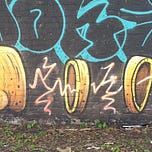


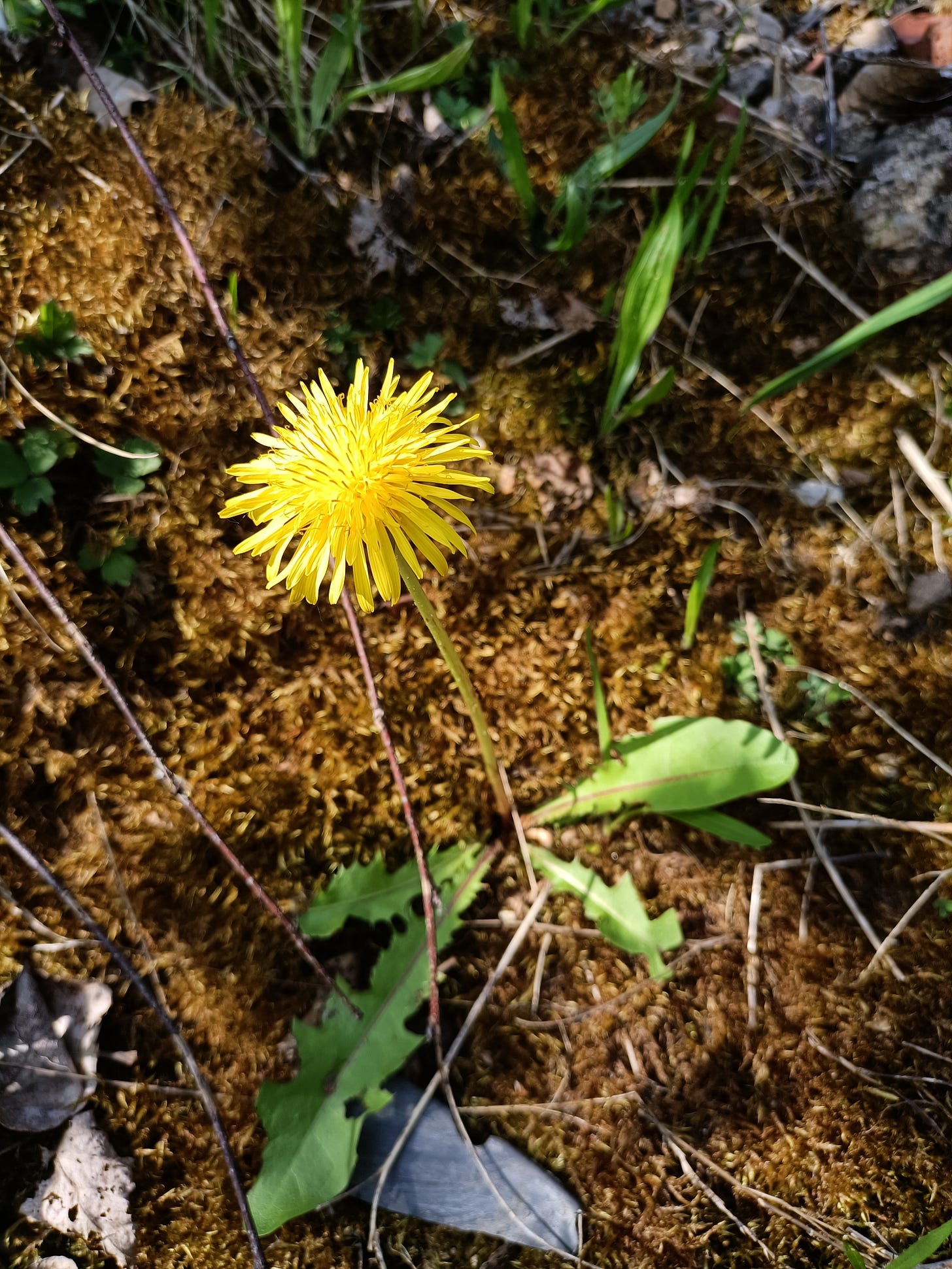
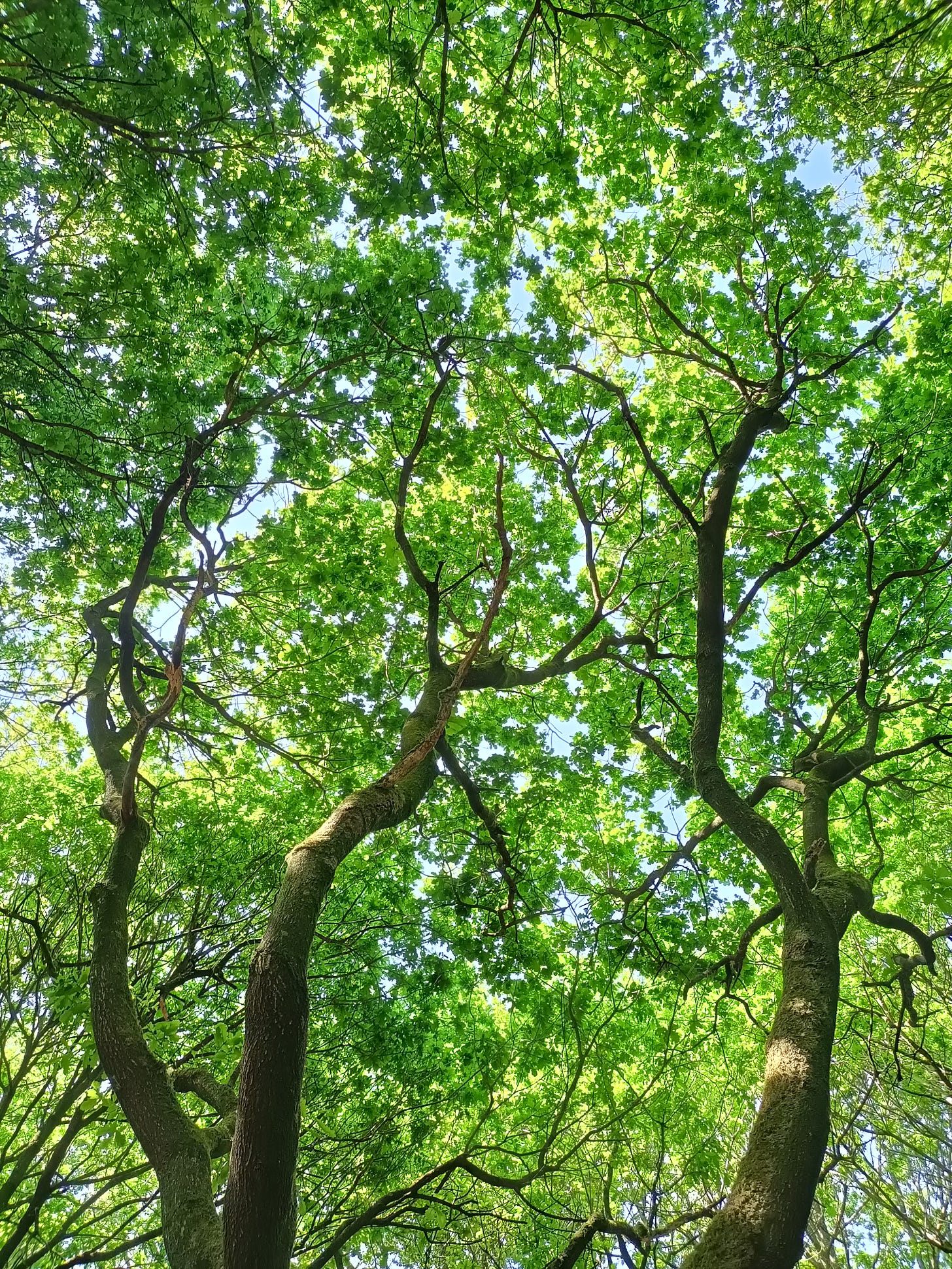
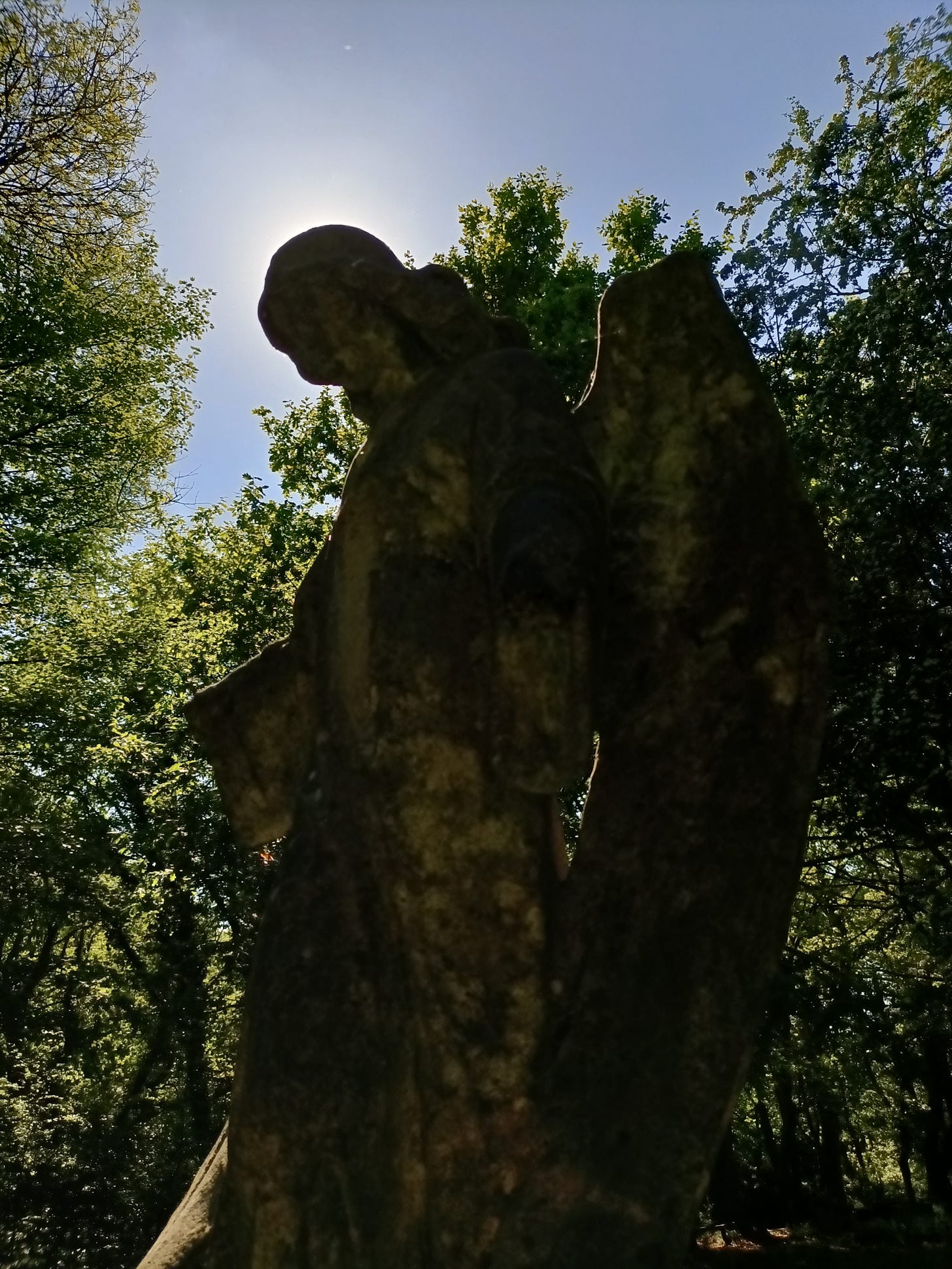
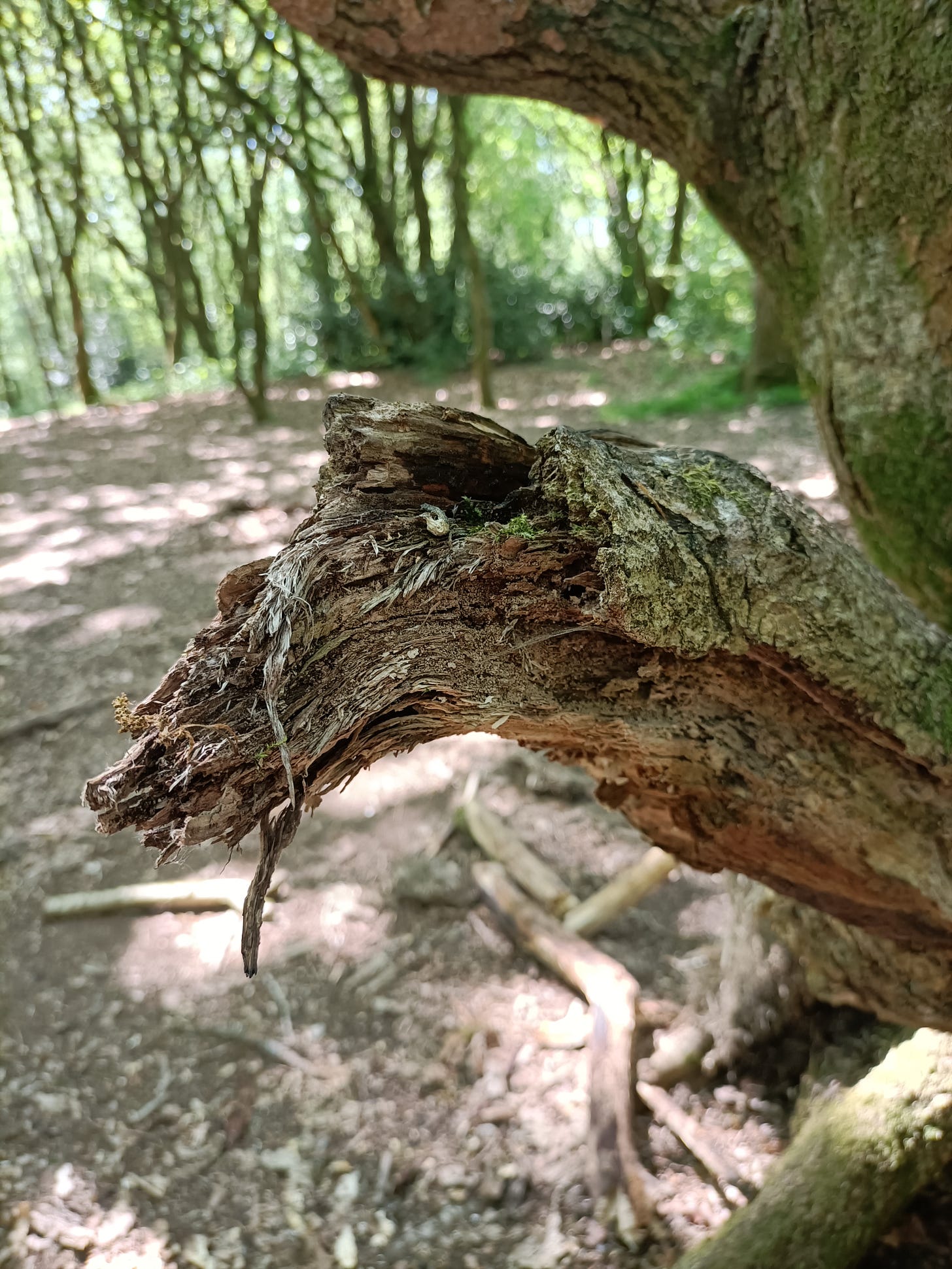
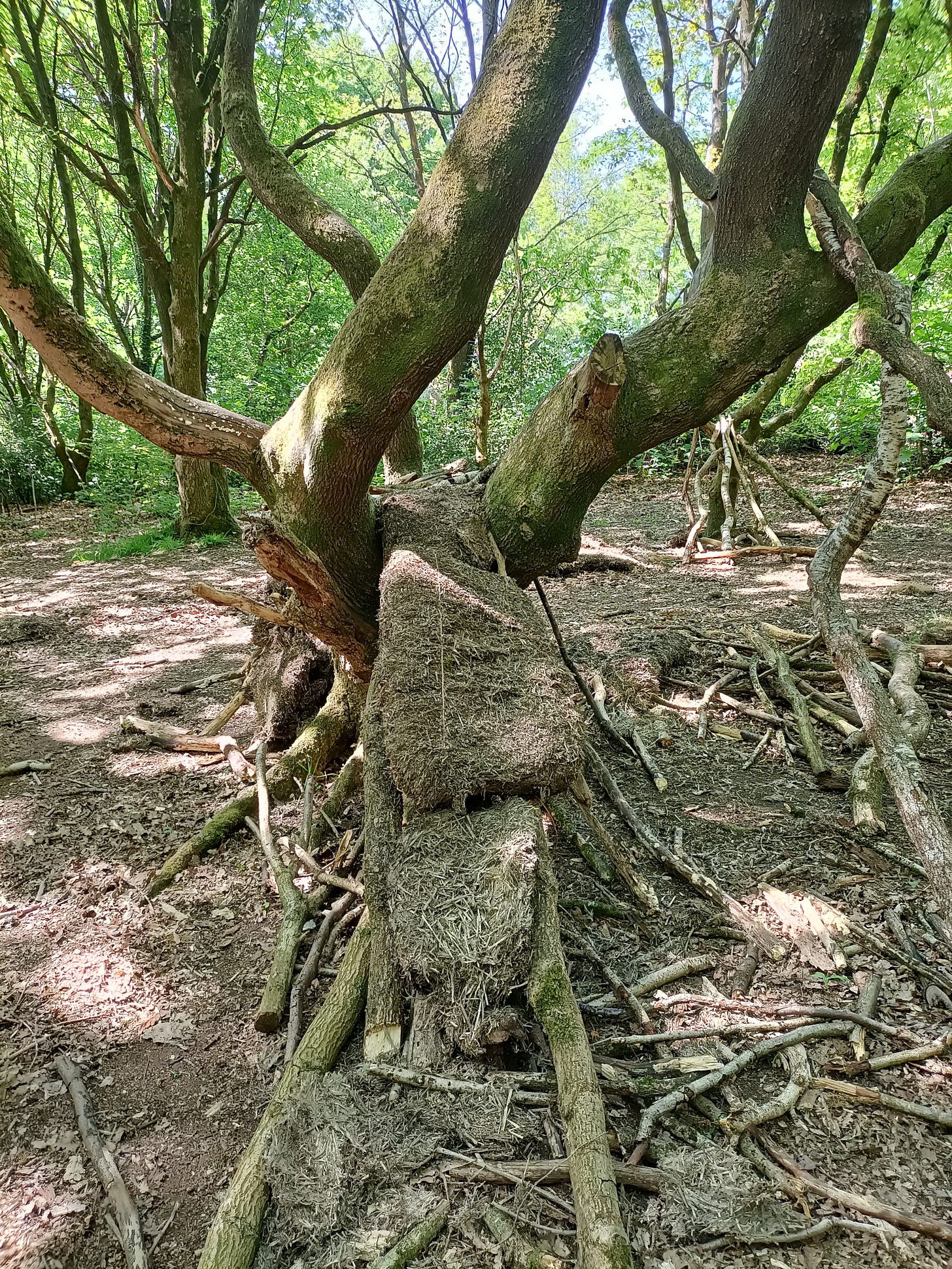
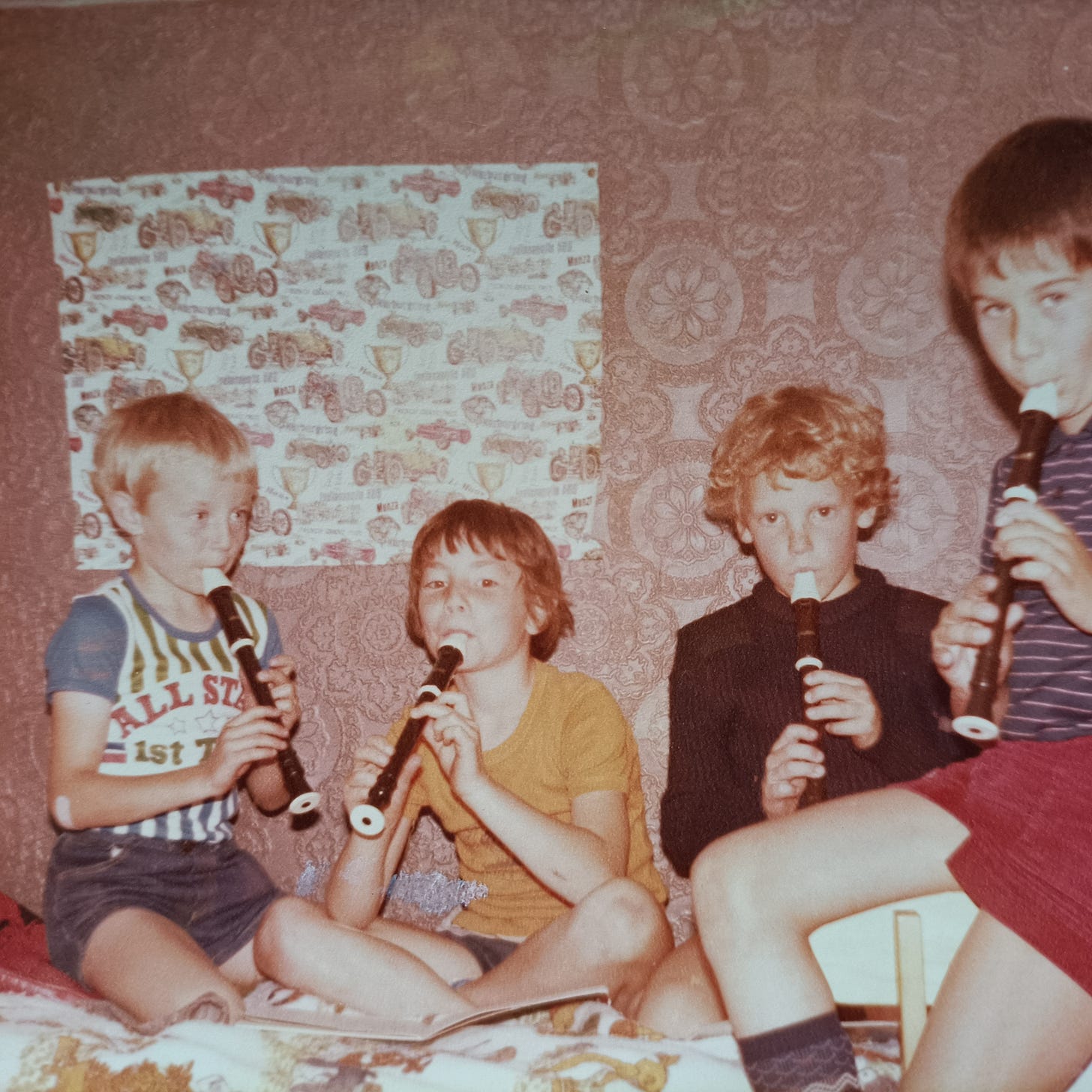
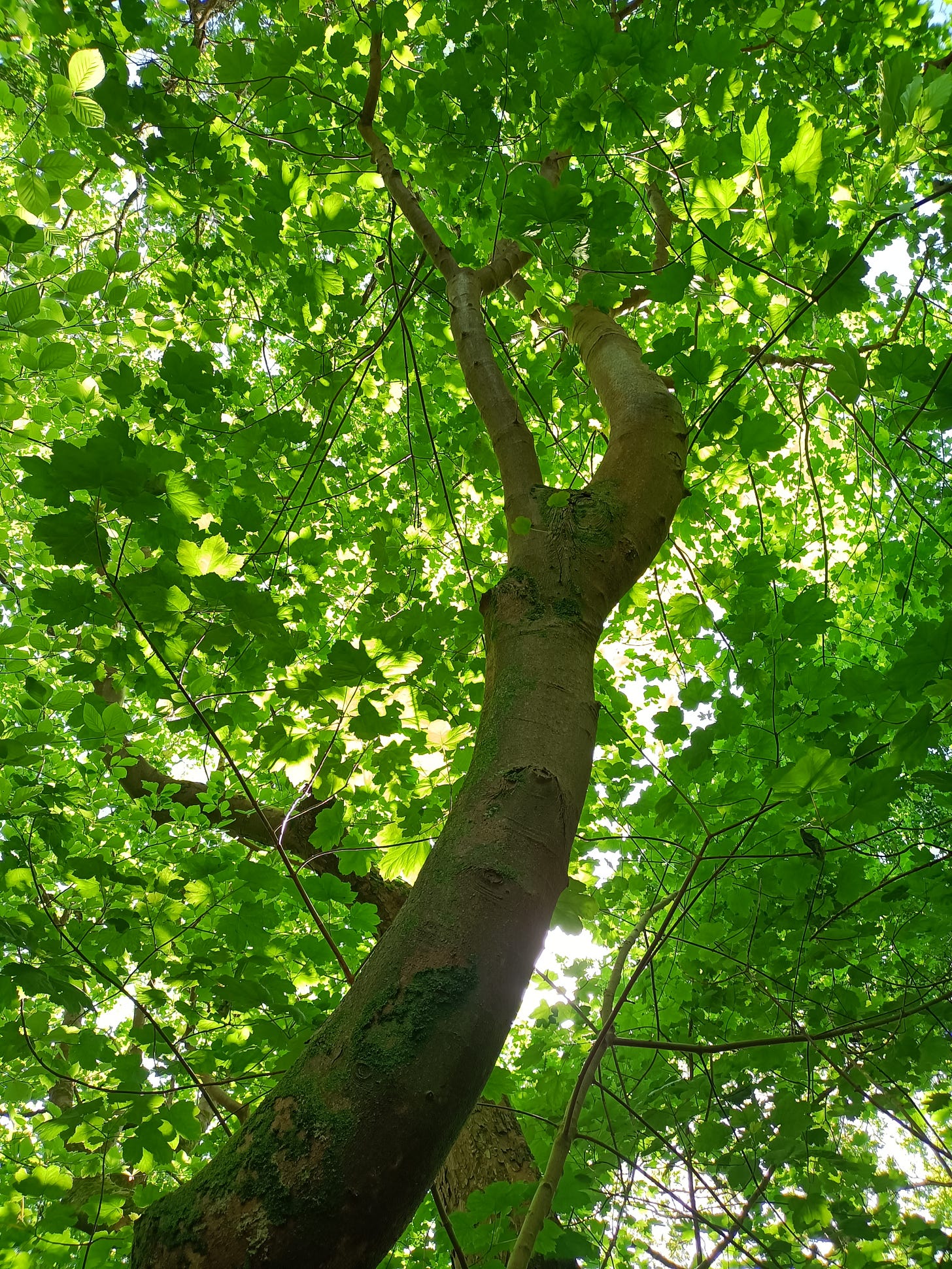
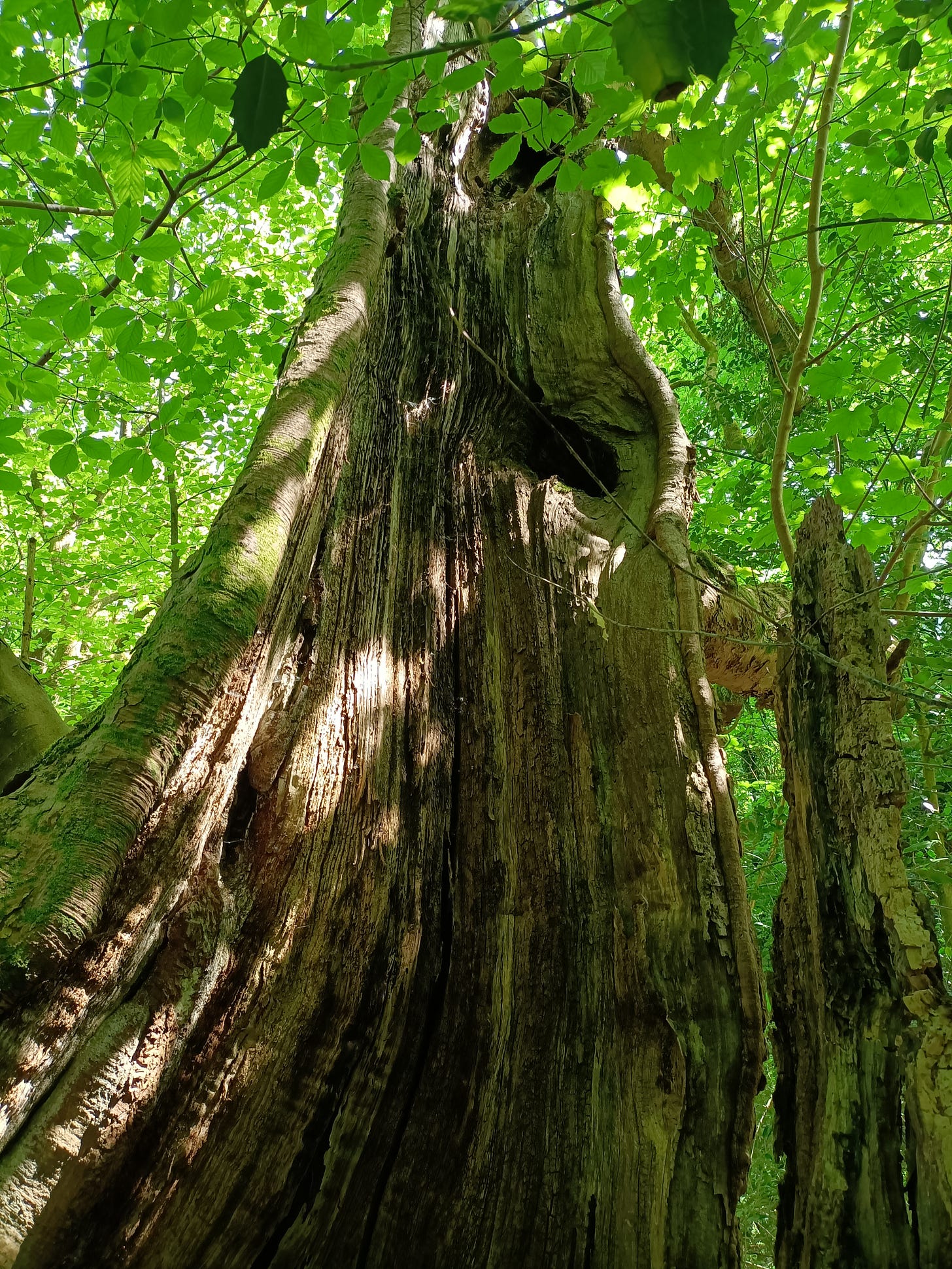
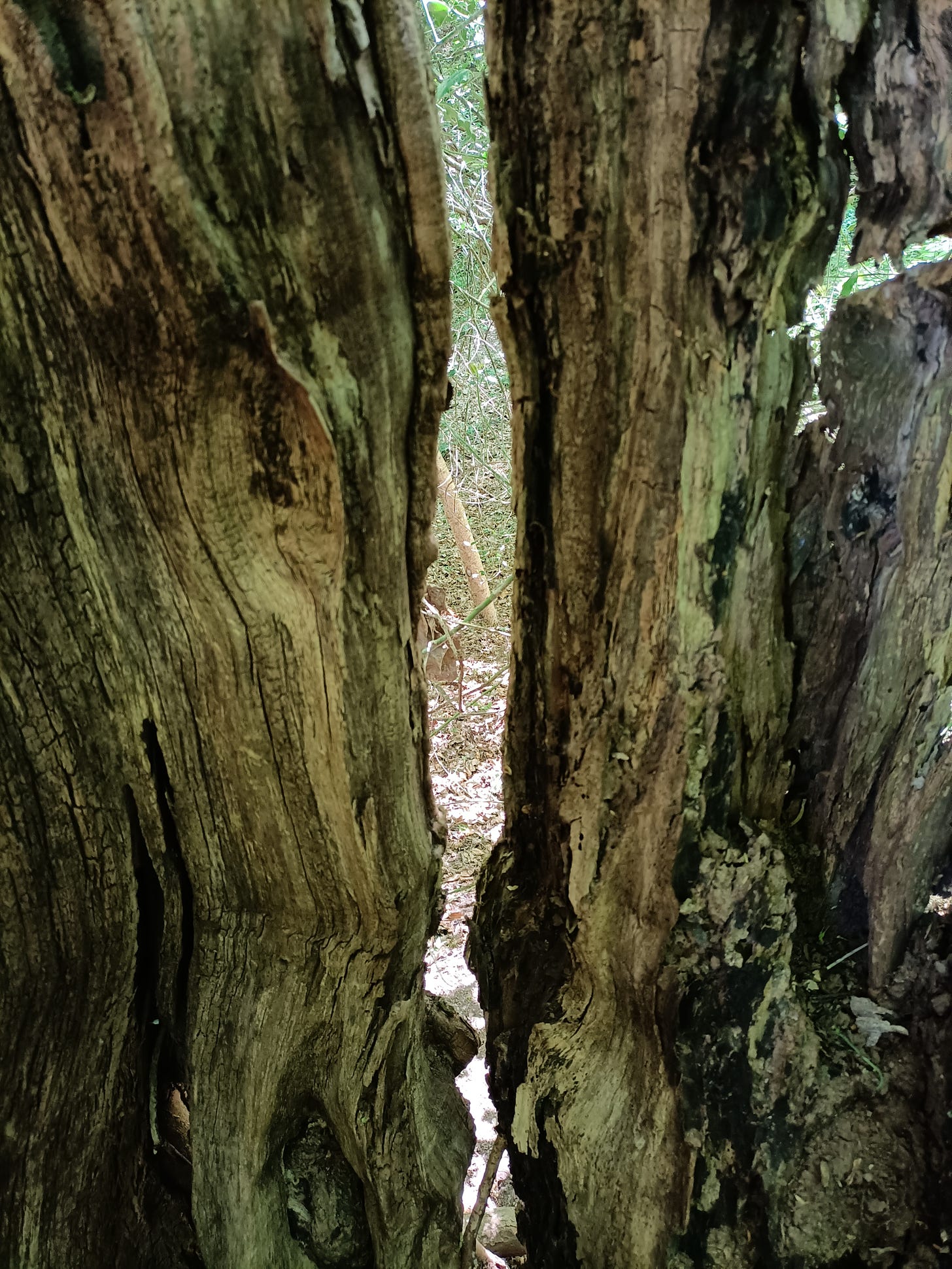
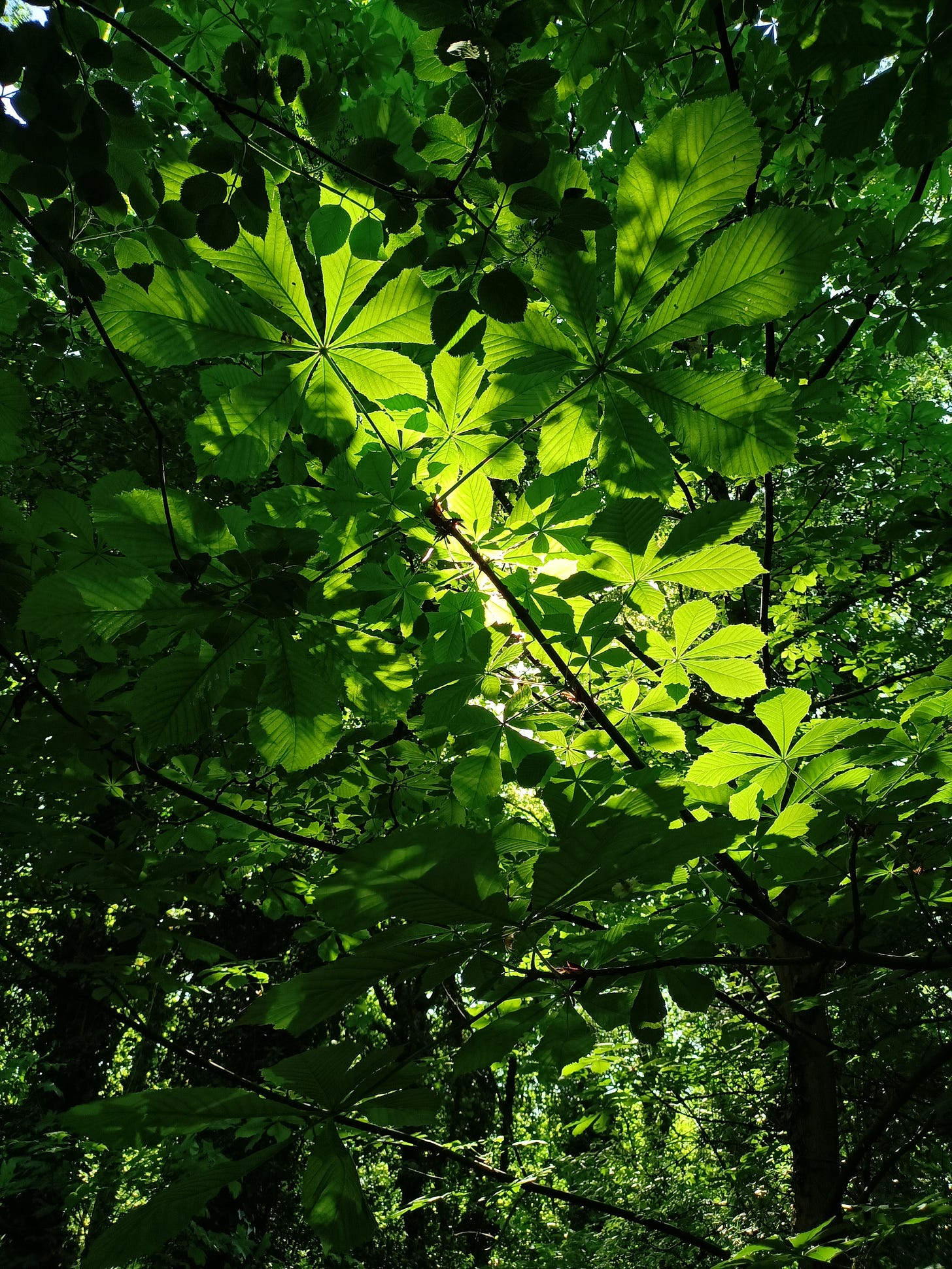








Share this post